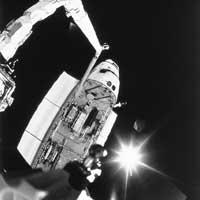There are no garbage collectors in space

Launch into space satellites, rockets, etc. It is easy, yes, but who then receives the residues that no longer serve for anything or are produced by accidents? Well no one. There they are turning around the earth. Most of the garbage is in the lower orbit, that is, at about 2,000 km of altitude on the terrestrial surface. The rest is in geostable orbit at about 36,000 km of altitude.
Observations made using radar and optical telescopes have detected about 9,000 objects of more than 40 cm, of which only 700 are satellites in operation. These objects, however, are not very dangerous. Fragments of less than 20 cm that can cause an impact with a spacecraft and cause more serious damage, estimate that they can exceed 150,000.
It seems that with current technology it is not possible to collect this garbage, so the only solution is to generate as little garbage as possible. For this purpose, the European Space Agency (ESA) proposed in Germany, in its third congress on space waste, two measures: on the one hand, to avoid spatial explosions and, on the other, the entry into the terrestrial atmosphere of satellites that will not be used anymore.





